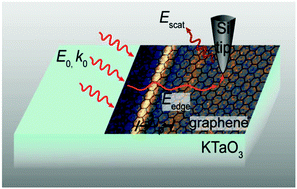Nano-imaging of an edge-excited plasmon mode in graphene†
Abstract
The idea of squeezing optical field intensity into nanoscopic dimensions can be achieved through plasmon polaritons, where the prerequisite is to bridge the unmatched momentum of plasmons and free-space photons. Conventionally, complicated subwavelength structures or artificial dipole nanostructures are adopted to impart the necessary momentum for the plasmon excitation. In this work, we show that by using the near-field imaging technique, the plasmon can be launched directly from the edge of graphene lying on the high-κ oxide substrates when illuminated by an infrared light. In addition, we show that such an edge-excited mode can be remarkably tailored by changing the angle between the graphene edge and the incident light field. Further theoretical analysis reveals the strength of the edge-excited mode and its superposition with a tip-excited mode and an edge localized mode. We attribute our findings to the reduced Coulomb scattering and phonon scattering in graphene, allowing the edge-excited mode to be identified. The conceptual edge “antenna” is found to be a very convenient approach to initiate plasmons in two-dimensional systems, which opens up a compelling route for realising nanophotonic applications.



 Please wait while we load your content...
Please wait while we load your content...